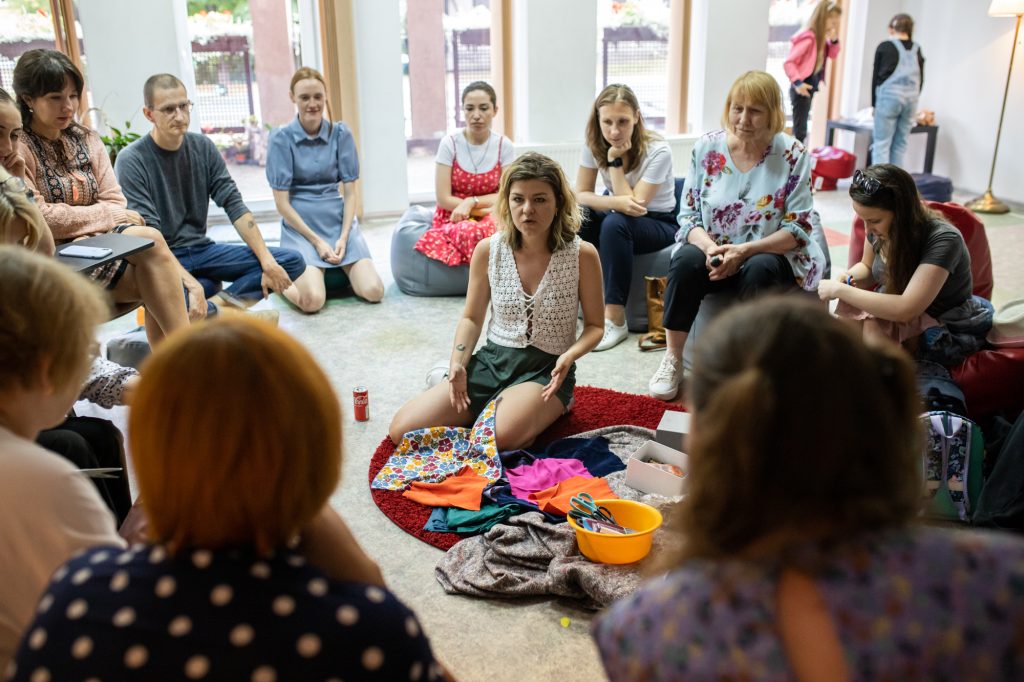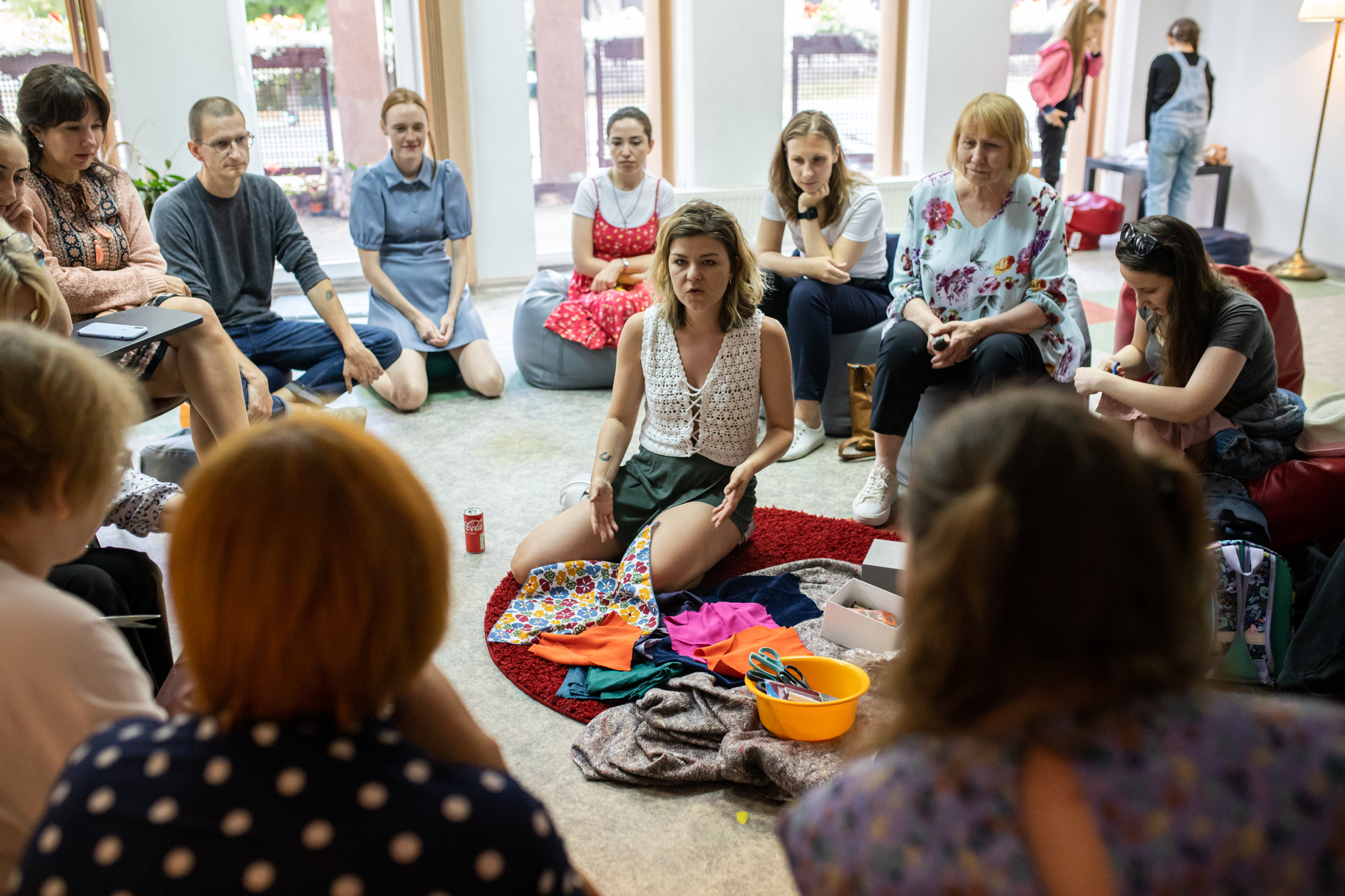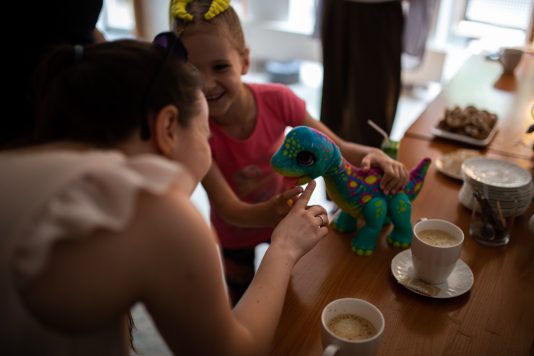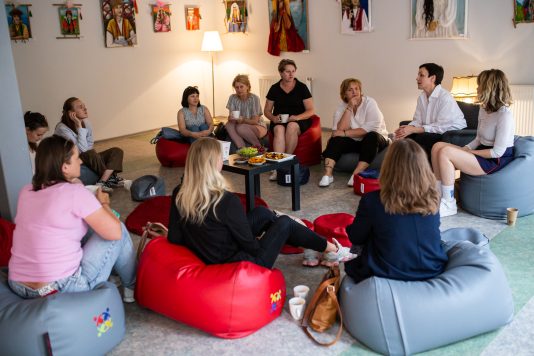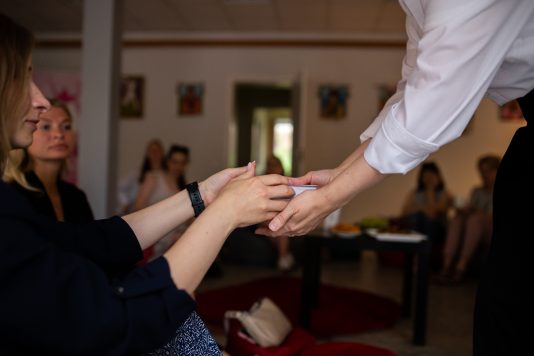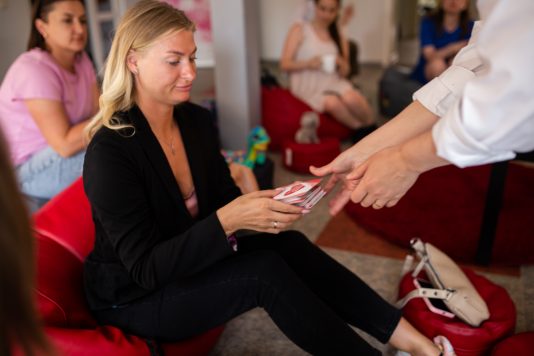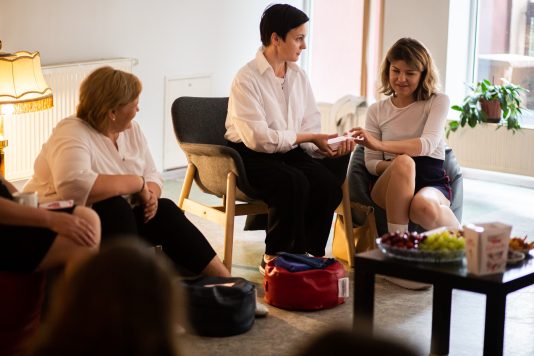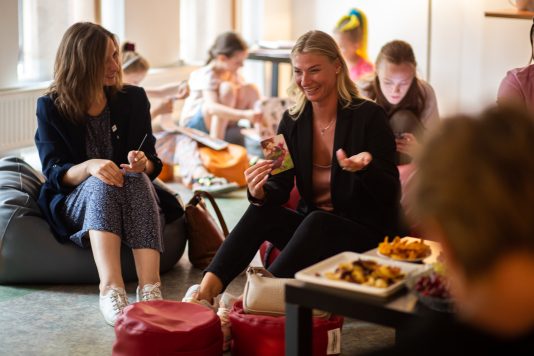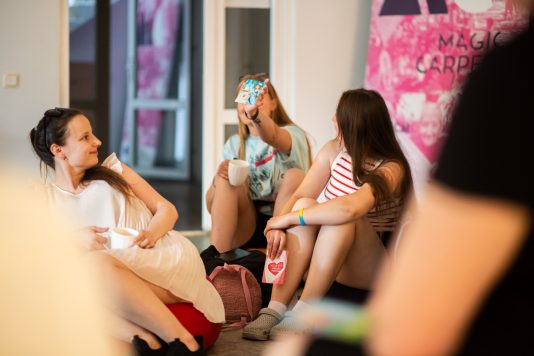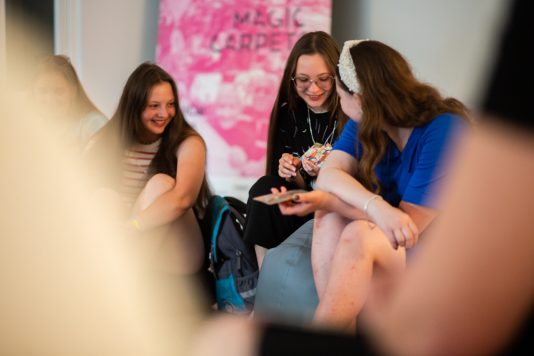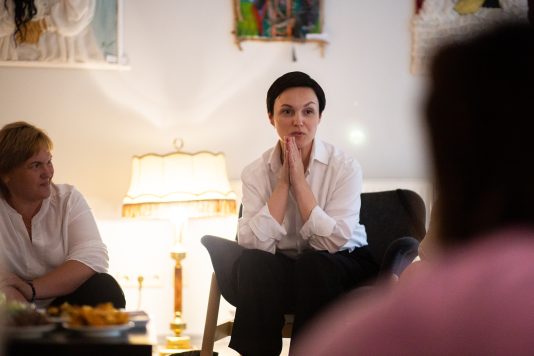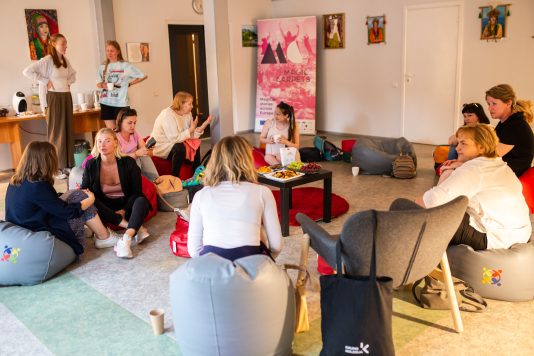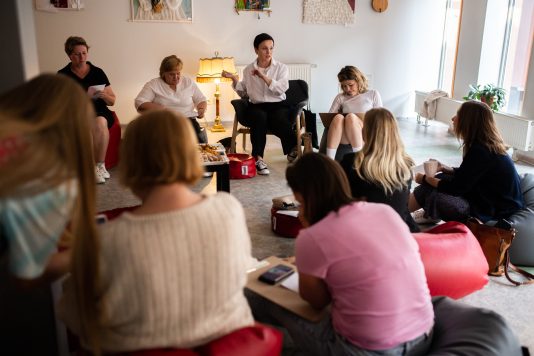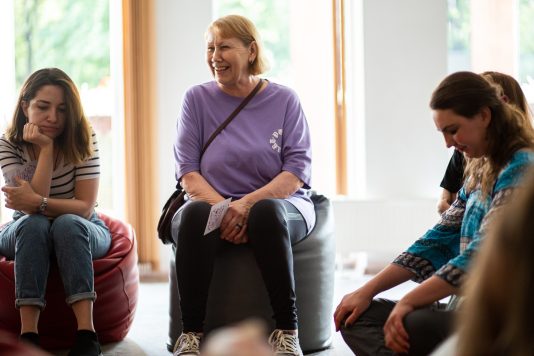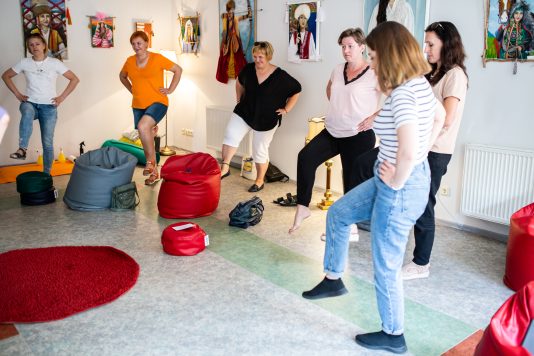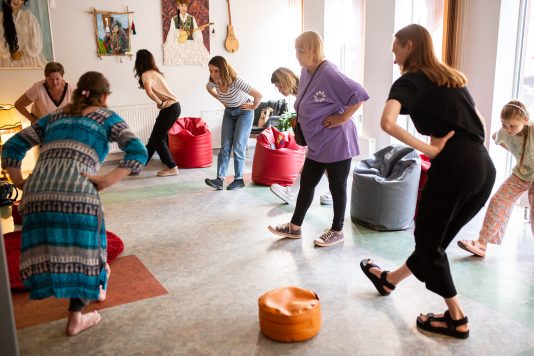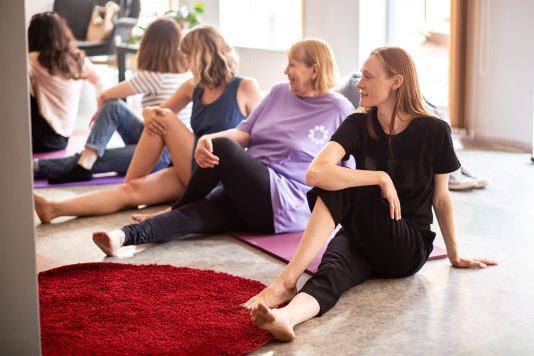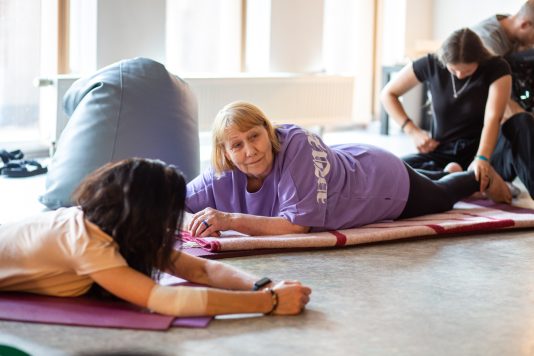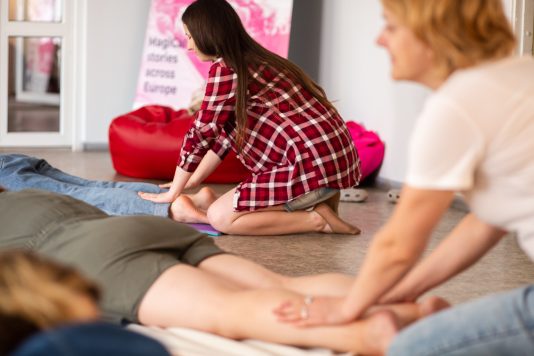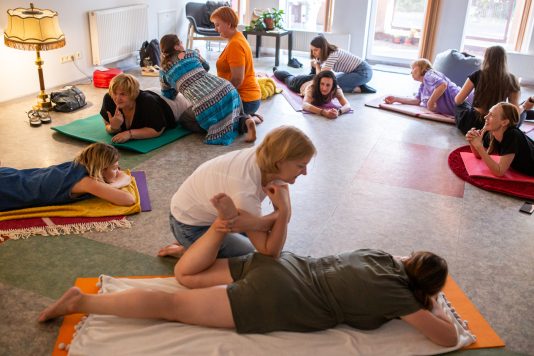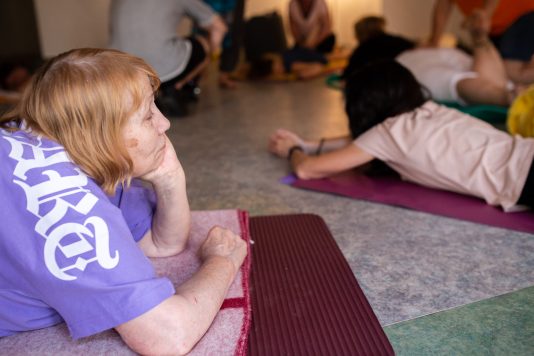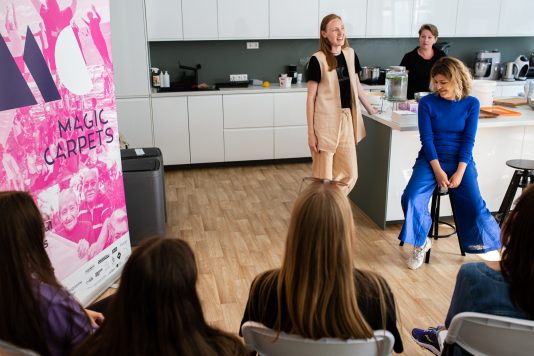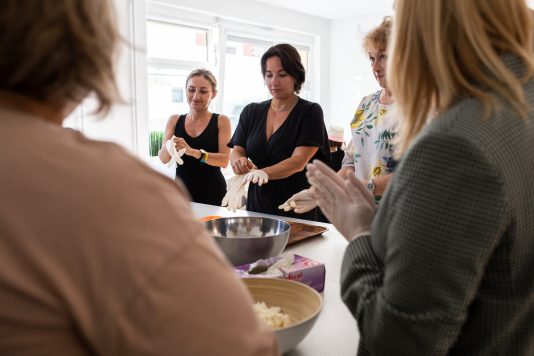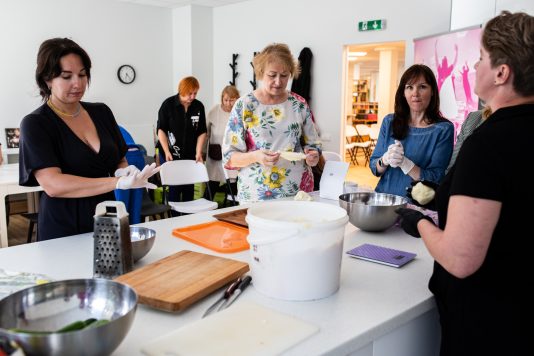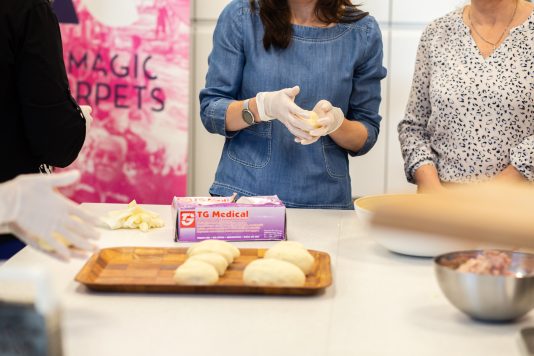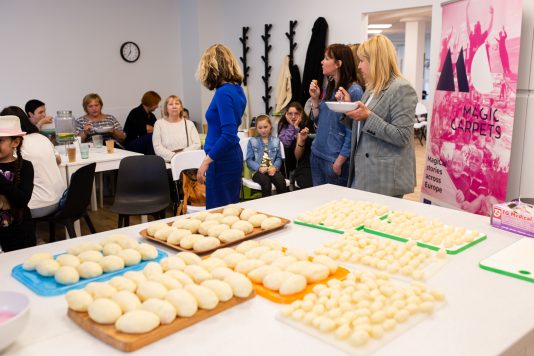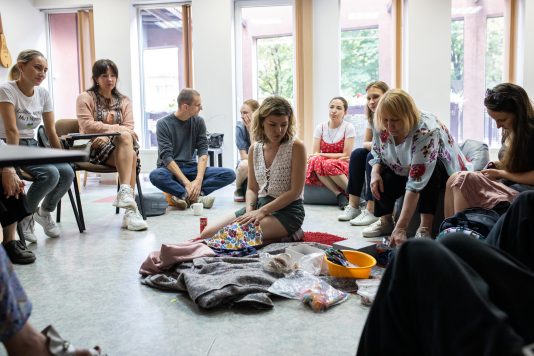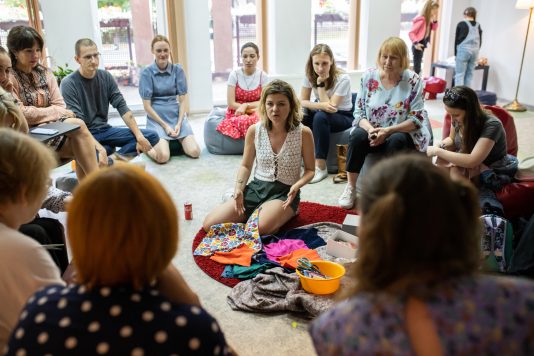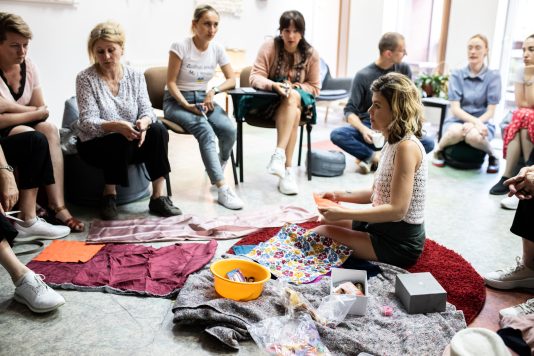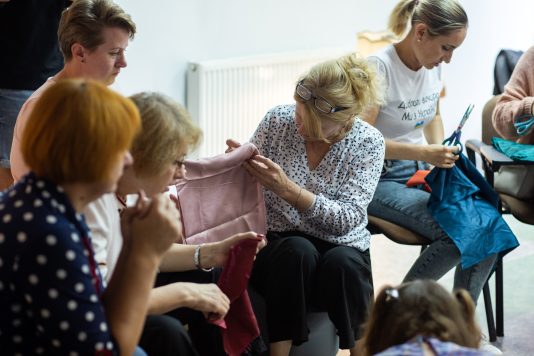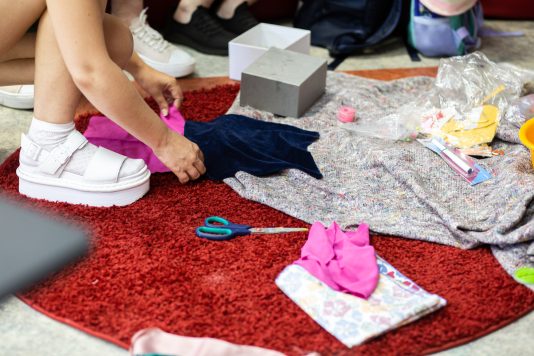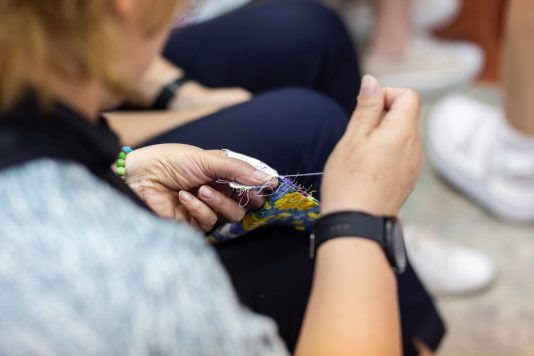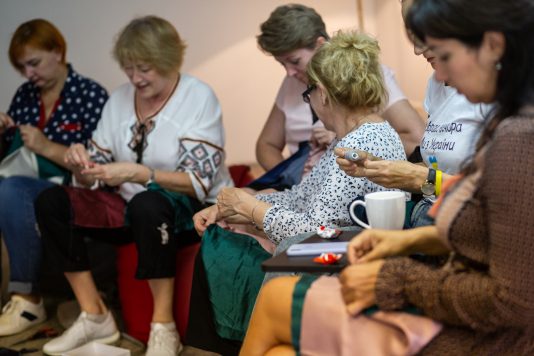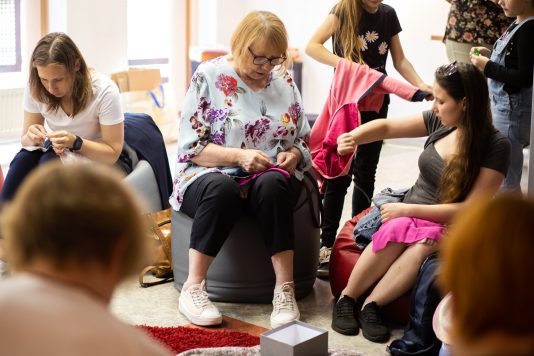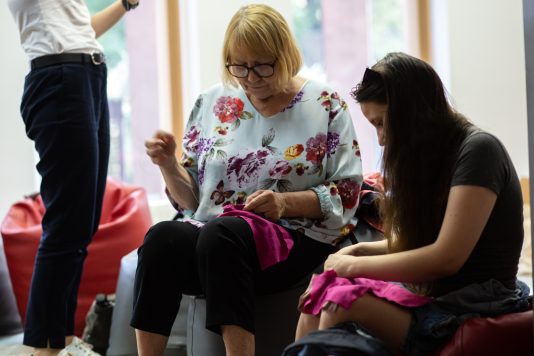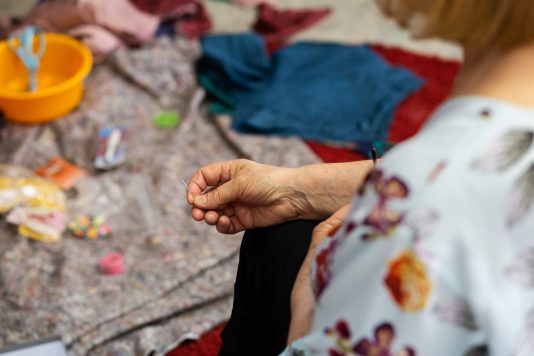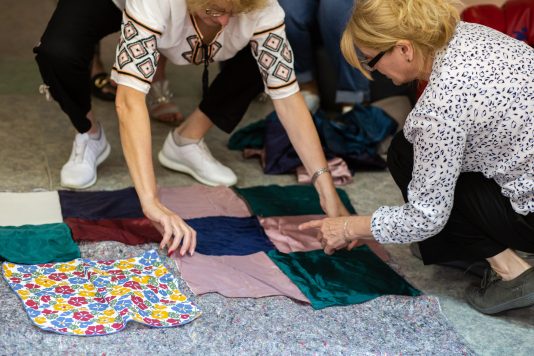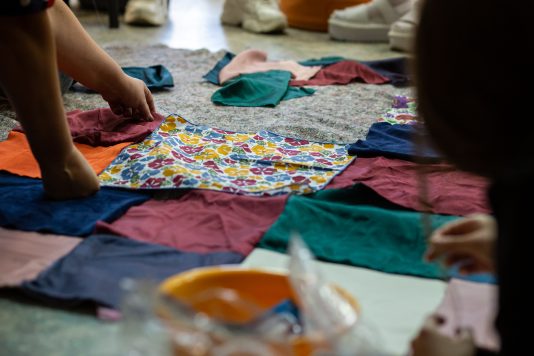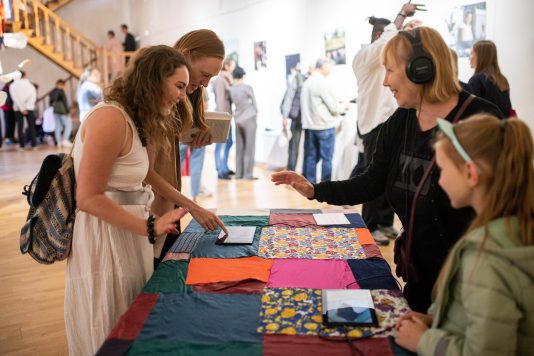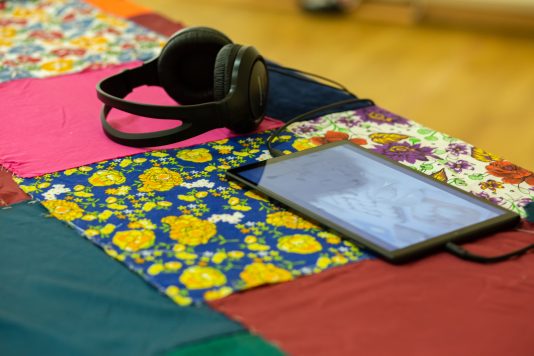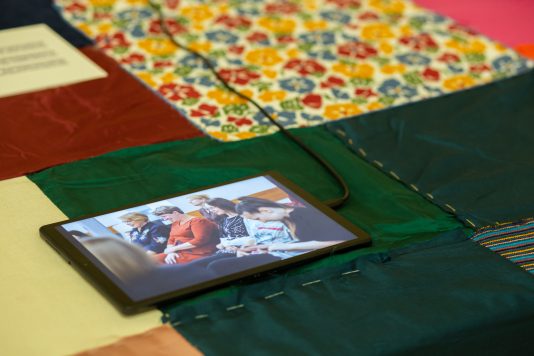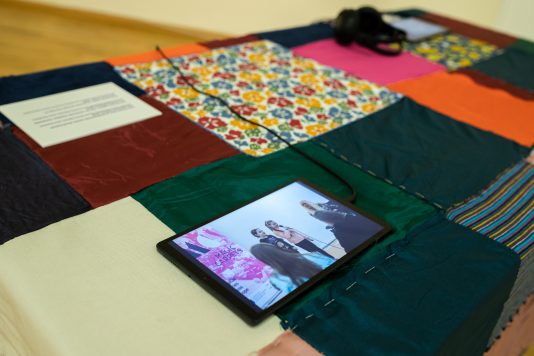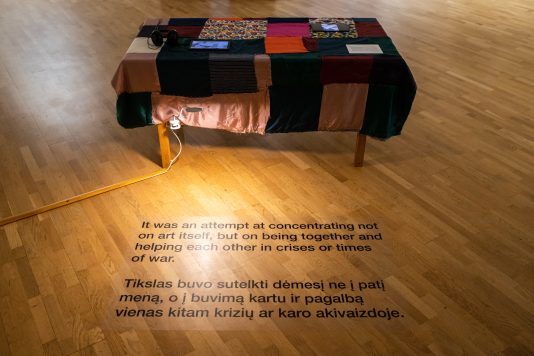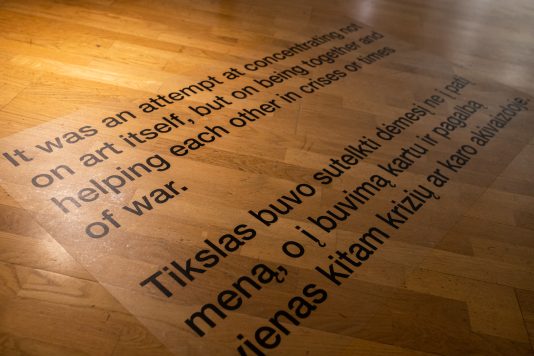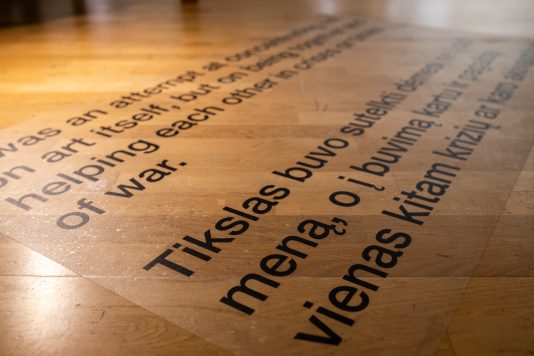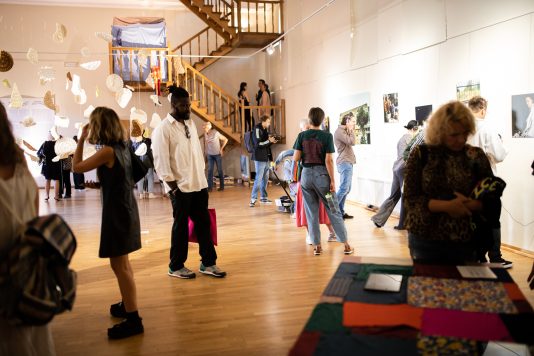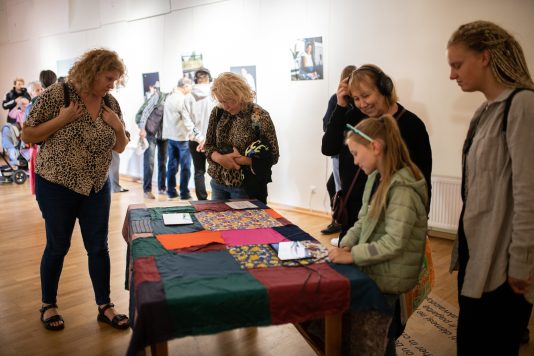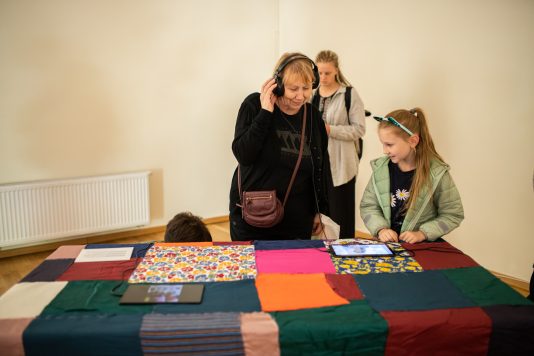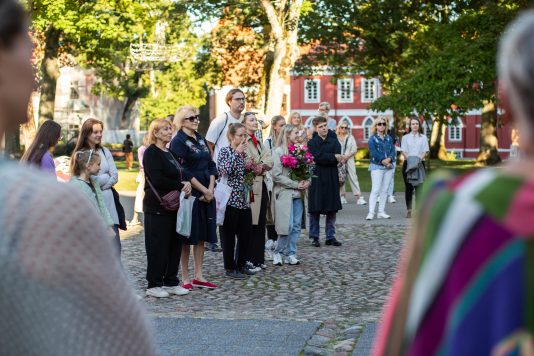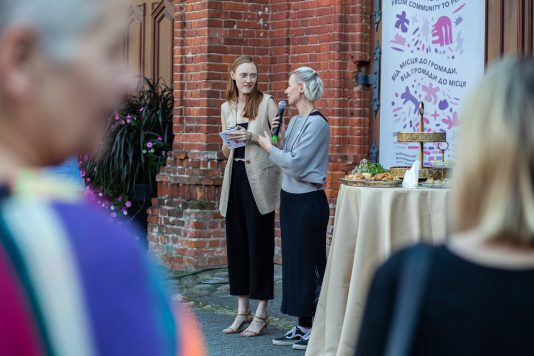“Community as a Healing Resource” by Yulia Krivich
“It was an attempt at concentrating not on art itself, but on being together and helping each other in crises or times of war”. This statement, boldly inscribed in large black lettering on the floor, welcomes visitors as they approach the “Community as a Healing Resource” installation, created by Yulia Krivich in 2023 for the group exhibition “From Place to Community. From Community to Place” at Raudondvaris Arts Incubator in the Kaunas district. This installation represents the culmination of Yulia’s participation in the Magic Carpets artistic residency held in Kaunas in July 2023. It features a standard-sized wooden table draped in a handcrafted textile carpet or tablecloth, composed of a variety of colours and an assortment of small textile pieces, some showing signs of wear or stitched together in an amateur manner. Adorning this tablecloth are two tablet screens: one displaying images and the other presenting a video piece meticulously edited by the artist. These visuals capture the most significant moments, shedding light on the installation’s underlying meaning.
Originally from the Dnipro region of Ukraine, Yulia Krivich relocated to Warsaw, Poland, twelve years ago. Today, she transcends the traditional confines of being solely a visual artist. Her involvement in political and social activism, along with her curatorial practice, paints a comprehensive portrait of a socially engaged and responsible individual who unites community members. Yulia’s approach is post-artistic, pushing the boundaries of what art should resemble and the activities it should encompass. She maintains that through this approach, she can deconstruct age-old cultural myths, spotlight intricate and obscured issues, and craft forms of art that resonate with societal value. Yulia is a co-founder of the “Sunflower” Solidarity Community Centre within the Museum of Modern Art in Warsaw and is an active member of the Soniakh Digest team, a digital platform that investigates contemporary information warfare and geopolitics from an Eastern European perspective. Yulia firmly asserts, “Art is political and capable of shaping reality.”
For the Magic Carpets residency in Kaunas, Yulia undertook a unique endeavour to reshape the lives of Ukrainian individuals residing in Kaunas due to their distinct experiences. The project “From Place to Community. From Community to Place” invited a community of women spanning various ages who had sought refuge in Lithuania, specifically in Kaunas, following the large-scale invasion that engulfed their homeland in February 2022. The primary emphasis of the project was to reflect on the relationship between people and space, exploring both the influence of space on people and the reciprocal impact of people on space. This was done through creative placemaking approaches, investigating how the physical environment facilitated their connections and mutual support. The “CulturEUkraine” centre, operational throughout 2022 as an open, free space for Ukrainian creatives to work, meet, and organise events, provided the backdrop for these interactions. Housed within the former Kaunas Central Post Office building on Laisvės alėja, this centre, regrettably, ceased activities at the close of 2022 due to financial constraints. However, the women’s community persisted and required a new space to convene, prompting the organisers of the Magic Carpets project to extend the activities of the community within the Kaunas Cultural Centre of Various Nations.
In the typical fashion of Magic Carpets residencies, community members are encouraged to partake in co-creative workshops led by the artists, rooted in the artists’ own creative practices. When the Ukrainian community members initially engaged with Yulia in Kaunas, her approach was slightly different. She first endeavoured to comprehend the community’s needs without imposing her artistic vision. Yulia graciously offered a safe and inviting place for communal gatherings, complete with refreshments, coffee, and tea. It was within this nurturing environment that the magic unfolded. Community members initiated the contribution of their distinctive ideas to meetings, eventually assuming control of the creative process and leading subsequent workshops themselves.
Alesia Katser, a numerologist and change coacher from Kharkiv, guided a workshop on self-analysis, utilising metaphorical cards to aid participants in exploring their emotions and aspirations for the future. Nadiia Kondratiuk, a professional masseuse from Donetsk, shared her expertise in diverse massage techniques. Svitlana Poradinska, a professional economist from Odesa, who, while in Kaunas, plied her trade as a restaurant chef, hosted a workshop on the preparation of traditional Lithuanian dishes, such as potato dumplings (cepelinai) and cold beetroot soup (šaltibarščiai), symbolising progress and adaptation in a new land. Kseniia Nikolska, a singer and vocal instructor from Kyiv, nurtured self-confidence in a singing workshop, with Ukrainian songs touching the hearts of all participants. For the final gathering with the community, Diana Povilaitus, a technology student hailing from Kherson, proposed the creation of a symbolic carpet representing the time spent together and the solidarity among individuals with diverse yet shared experiences, while fostering hope for the future. This unique carpet was fashioned from textiles brought by workshop participants from their own homes, lovingly stitched together. This carpet now graces the wooden table within Yulia Krivich’s final installation, entitled “Community as a Healing Resource.”
Throughout the entire journey, Yulia actively engaged as an equal participant in all of the workshops, seeking to establish meaningful connections, listen to the narratives of others, and share her own experiences as a migrant. The women were profoundly inspired and deeply moved by the atmosphere cultivated during these gatherings, where they felt a profound sense of freedom and unity. Not a single meeting concluded without either joyous or poignant tears in their eyes, and long-lasting friendships were solidified. This stands as a testament to how art can be remarkably versatile and profoundly influential, serving as a means to extend warmth, unity, and happiness to people. Yulia’s artistic residency in Kaunas undeniably demonstrated that socially engaged artistic practices have the power to bring about a positive transformation within individuals and society at large.
Curator of the project Brigita Bareikytė
Big thank you to the community members:
Alesia Katser, Galina Yaremchuk, Kseniia Nikolska, Natalia Kanivets, Natalia Filchakova, Nadiia Kondratiuk, Olena Kurkchi, Svitlana Poradinska, Klavdiia Dryzyk, Yevanhelina Bilenko, Polina Komarynska, Kristina Komarynska, Diana Povilaitus, Kapustian Oksana, Maliuk Tetiana, Maliuk Stanislava, Poradinska Tetiana and others.
And to all others who contributed to the realization of this project: Gintarė Žaltauskaitė, Vilma Bražiūnaitė, Saulius Valius, Roberta Grigaliūnaitė, Ignas Andriuškevičius, Dovydas Gaulė, Irmantas Kuskys, Džiugas Žemaitis, Anna Gaidai, Martas Damažeskas, Marius Paplauskas, Ilona Paškevičiūtė, Aistė Varkulevičiūtė, Kristina Adomaitė, Laura Kanapienytė, Nataliia Tataurova, Agnė Poderytė, Gerda Linkevičiūtė.
Partners: Jam Factory Art Centre, Raudondvaris Manor, Kaunas Cultural Centre of Various Nations, Kaunas Municipal Vincas Kudirka Public Library, Kaunas District Municipality
Project funded by: European Union and Lithuanian Council for Culture.
Curatorial text by Brigita Bareikytė
